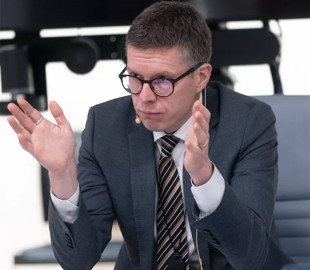
On December 16-17, the 10th summit of the JEF (Joint Expeditionary Force) – the security alliance of Great Britain, Sweden, Iceland, Norway, Sweden, the Netherlands, Estonia, Latvia, Lithuania, Finland, Denmark – is underway in Tallinn
Estonia has imposed sanctions not only against Russian propagandists, but also companies associated with them related to them. This was stated by Erkki Tori, Head of Coordination of Security and Defense Issues of the Estonian Government Office, in response to a question from «Media Detector» about the introduction of sanctions against Russian propagandists during a press tour from the Estonian Government Office.
«One of the first things we did on February 24, 2022 was the decision to shut down Russian propaganda actors. Therefore, our national position on Russian propagandists is very clear.
And Estonia has not only imposed sanctions on these individuals nationally, but we have also imposed sanctions on companies and individuals associated with the sanctions. So we have been very consistent in this» – said Erkki Tori.
The senior official also spoke about the 4A (acknowledgment, assessment, attribution, accountability) approach to hybrid threats. This is what is currently being implemented in Estonia at the government level.
«The goal of hybrid operations is actually quite clear: to find and increase uncertainty, instability and divisions between countries, governments and groups in society. Russia seeks to highlight the lack of unity in the West, as well as to reduce our support for Ukraine. We assess that hybrid activities will continue in the future.
And because this activity is supposedly inexpensive and low-risk, Russia uses proxy forces. In this regard, we have a four-pronged approach. The first is to recognize that we are talking about these hybrid activities and that we are building our own understanding of the situation.
The second is to assess, meaning we not only see different actions, but also understand that these are actions coordinated by Russian intelligence services and that they are directed against us. The third issue is attribution, meaning we can actually say that these hybrid actions are being carried out, where and for what purpose.
And fourth, it's accountability, that we can send signals to the Russians that their activities are not tolerated. I think that the understanding of the Russian presence in cross-border issues has really grown over the past year», – summed up Erkki Tori.
On December 16-17, the 10th summit of the JEF (Joint Expeditionary Force) – the security alliance of the United Kingdom, Sweden, Iceland, Norway, Sweden, the Netherlands, Estonia, Latvia, Lithuania, Finland, Denmark – is underway in Tallinn. The JEF alliance was established in 2014 under the chairmanship of the United Kingdom to better coordinate European and international security issues. The main topics of discussion this year are defense spending, support for Ukraine and countering hybrid threats.

